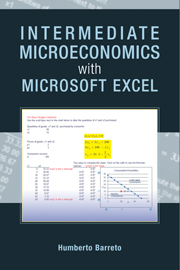Book contents
- Frontmatter
- Contents
- Preface
- User Guide
- Introduction
- PART I THE THEORY OF CONSUMER BEHAVIOR
- PART II THE THEORY OF THE FIRM
- 2.1 Production Function
- 2.2 Input Cost Minimization
- 2.3 Output Profit Maximization
- 2.4 Input Profit Maximization
- 2.5 Consistency in the Theory of the Firm
- 2.6 Monopoly
- 2.7 Game Theory
- PART III THE MARKET SYSTEM
- Conclusion
- Index
2.6 - Monopoly
from PART II - THE THEORY OF THE FIRM
Published online by Cambridge University Press: 05 June 2012
- Frontmatter
- Contents
- Preface
- User Guide
- Introduction
- PART I THE THEORY OF CONSUMER BEHAVIOR
- PART II THE THEORY OF THE FIRM
- 2.1 Production Function
- 2.2 Input Cost Minimization
- 2.3 Output Profit Maximization
- 2.4 Input Profit Maximization
- 2.5 Consistency in the Theory of the Firm
- 2.6 Monopoly
- 2.7 Game Theory
- PART III THE MARKET SYSTEM
- Conclusion
- Index
Summary
Instead of using marginal conditions as Cournot had done, Marshall used total ones. Perhaps for that reason, Cournot's marginal-revenue concept was forgotten and had to be rediscovered in the 1930s.
Hans BremsLike the perfectly competitive firm, a monopolist has three interrelated optimization problems. Attention is focused on the Output Profit Max problem because that is where the essential difference lies between a PC firm and a monopoly. Of course, we know that via consistency, monopoly power manifests itself on the input side also. A monopoly will produce less than a PC firm and, in turn, hire less labor and capital.
Definition and Issues
A monopoly is defined as a firm that is the sole seller of a product with no close substitutes. The definition is inherently vague because there is no clear demarcation for what constitutes a close substitute.
Consider this example: Your local cable provider may have an exclusive agreement to provide cable TV in your community. You could argue that your cable provider is a monopoly because it is the sole seller of cable TV. But what are the substitutes for cable TV?
Years ago, cable TV was the only way to access subscription channels such as ESPN and HBO. Commercial broadcasts (with national broadcasters such as ABC, NBC, and CBS and local channels) were a poor substitute for cable TV. In this environment, cable TV would be a good example of a monopoly.
- Type
- Chapter
- Information
- Intermediate Microeconomics with Microsoft Excel , pp. 389 - 406Publisher: Cambridge University PressPrint publication year: 2009



